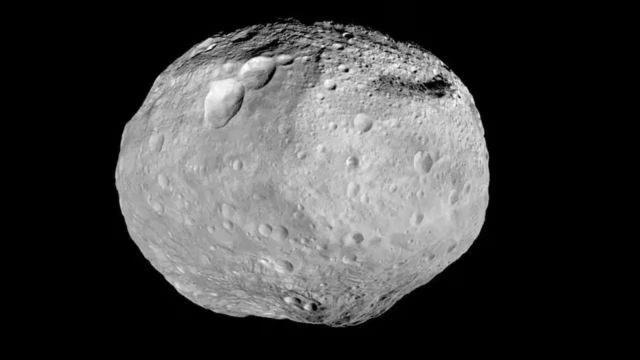
Asteroid Vesta isn’t protoplanet but a chunk of lost world: Study
In a groundbreaking study published in Nature Astronomy, researchers from Michigan State University have challenged the long-held assumption that Asteroid Vesta is an embryonic planet. Instead, they propose that Vesta is a chunk of an ancient, lost world that never formed into a fully-fledged planet.
Asteroid Vesta, the second-largest object in the asteroid belt between Mars and Jupiter, has long been considered a protoplanet, a celestial body that has the potential to become a full-fledged planet. However, the new study suggests that Vesta’s composition and structure are more akin to a fragment of a larger, long-lost world.
The research was led by Dr. Kevin Righter, a professor of geology at Michigan State University, and his team. They analyzed the chemical composition of Vesta’s surface and subsurface, using data from NASA’s Dawn spacecraft, which orbited Vesta from 2011 to 2012.
According to the study, Vesta’s surface is characterized by a unique blend of minerals, including calcium-aluminum-rich pyroxene and olivine. These minerals are typically found in the crust of terrestrial planets, such as Earth and Mars, but they are also common in the mantle of large planets like Jupiter.
The researchers suggest that Vesta’s composition is consistent with it being a fragment of a larger planet that was broken apart by catastrophic events in the early days of the solar system. This would have occurred when the asteroid belt was still forming, and the gravitational forces of nearby planets were still strong.
“We found that Vesta’s composition is more similar to that of a terrestrial planet than an asteroid,” said Dr. Righter. “This suggests that Vesta is a chunk of an ancient, lost world that never formed into a full-fledged planet.”
The study also challenges the assumption that Vesta has a dense core, which is a characteristic feature of planetary bodies. Instead, the researchers propose that Vesta’s core is likely to be small and irregularly shaped, consistent with its status as a fragment of a larger planet.
So, what does this mean for our understanding of the solar system? The discovery that Vesta is not a protoplanet but a chunk of a lost world has significant implications for our understanding of the early days of the solar system. It suggests that the asteroid belt was formed through a series of catastrophic events, including the break-up of a large planet or planets.
“This study opens up new avenues for research into the early history of the solar system,” said Dr. Righter. “It challenges our assumptions about the formation of the asteroid belt and the evolution of the solar system as a whole.”
The study’s findings also have implications for the search for life beyond Earth. Asteroid Vesta is one of the most accessible and well-studied asteroids in the solar system, and its composition and structure may hold clues to the origins of life on Earth.
“In the search for life beyond Earth, understanding the origins of the solar system is crucial,” said Dr. Righter. “This study provides new insights into the early history of the solar system, and may ultimately help us to better understand the origins of life on our own planet.”
The study was published in Nature Astronomy on September 9, 2020, and is available online at [news url]: https://indianexpress.com/article/technology/science/asteroid-vesta-piece-planet-no-exists-10007612/lite/.






